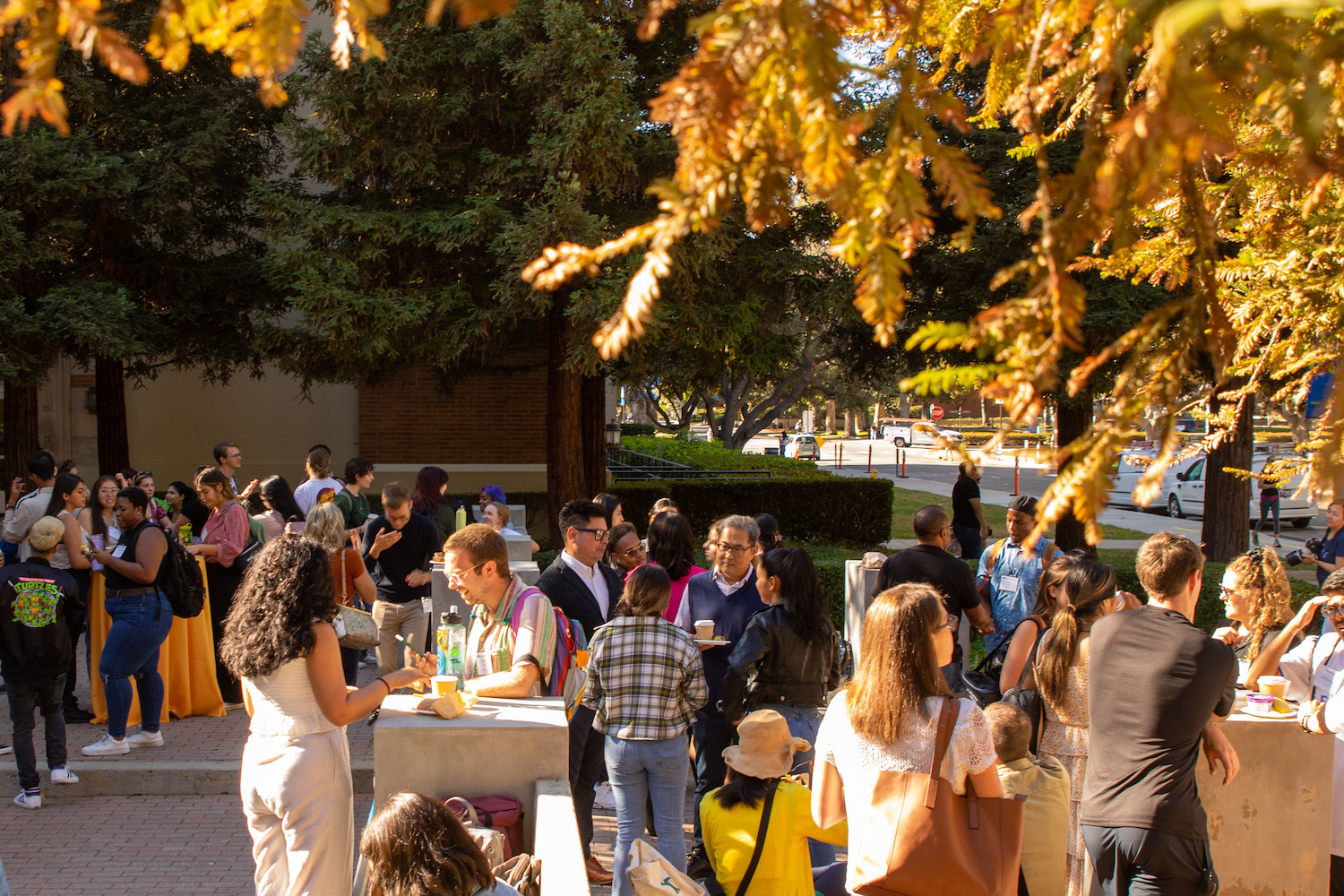Monkeypox Outreach Based on Science and Messaging
/0 Comments/in Luskin in the News Ian W. Holloway /by Mary BraswellA story by The 19th about strategies used on college campuses to reduce the spread of monkeypox cited the work of Social Welfare Professor Ian Holloway. In addition to leading UCLA’s Hub for Health Intervention, Policy and Practice and Gay Sexuality and Social Policy Initiative, Holloway serves on the scientific advisory committee to the California Department of Public Health. As monkeypox cases began to rise over the spring and summer, Holloway’s team quickly launched a multipronged campaign focused on science and messaging. This outreach provided accurate information about monkeypox to gay and bisexual men while noting that anyone can contract the virus, to avoid the stigmatizing language used to discuss HIV in past decades. In partnership with the Los Angeles LGBT Center, the team created an infographic explaining monkeypox transmission, symptoms and interventions. Holloway has emphasized that monkeypox outreach to men who have sex with men should be equitable, with a focus on queer men of color.
Making Connections at UCLA Luskin
/0 Comments/in Luskin's Latest Blog Gary Segura /by Mary BraswellThe UCLA Luskin School of Public Affairs kicked off the 2022-23 academic year with a series of opportunities to connect with students, alumni, faculty and staff. Welcome Week included a graduate student orientation that brought public policy, social welfare and urban planning students together and an undergraduate open house that shared information about the public affairs major during an outdoor luncheon. And on Sept. 22, the 11th annual UCLA Luskin Block Party drew a record crowd, including the School’s benefactors, Meyer and Renee Luskin.
View UCLA Luskin photo galleries from:
11th Annual UCLA Luskin Block Party
Celebrating an End to a ‘Slow-Moving Disaster’
/0 Comments/in Luskin in the News Donald Shoup, Michael Manville /by Mary BraswellAssociate Professor of Urban Planning Michael Manville spoke to the Los Angeles Times about California’s new law barring local governments from mandating parking spaces as part of most development near transit stops. “This is one of the biggest land-use reforms in the country,” Manville said after Gov. Gavin Newsom signed AB 2097 into law. “Parking requirements have been an absolutely slow-moving disaster,” Manville said. “We are turning the ship around.” News outlets including StreetsBlog, Bloomberg CityLab and Mother Jones credited research by Donald Shoup, distinguished research professor of urban planning, with laying the groundwork for AB 2097. Shoup’s decades of scholarship pointed out the faulty and arbitrary reasoning behind parking requirements, whose unintended consequences have included raising the cost of of housing and commercial development, creating incentives to drive instead of using transit, and increasing emissions.
Missed Opportunity to Deepen Connection With Latino Voters
/0 Comments/in Luskin in the News Sonja Diaz /by Mary BraswellA Los Angeles Times op-ed about the Rick Caruso mayoral campaign’s outreach to Latino communities cited Sonja Diaz, executive director of the UCLA Latino Policy and Politics Institute. Running as an outsider, Caruso is courting segments of the Latino vote that include moderate Democrats, independents, Catholics and others, raising the question of whether L.A.’s established political class understands that Latinos have a variety of political viewpoints. “We know Latinos are not a monolith,” Diaz said, “but does the California Democratic Party know the difference between Latinos in Sun Valley, Pacoima, Van Nuys, west of the 110 or east of the 110, Northeast and East L.A.?” Around the country, Republicans have made inroads with Latino voters while Democrats have missed opportunities to build the national profile of top elected leaders, Diaz noted in an Elle profile of Catherine Cortez Masto of Nevada, the only Latina in the U.S. Senate.
A Rise in Alcohol-Involved Suicides Among Women
/0 Comments/in Luskin in the News Mark S. Kaplan /by Mary BraswellAn article in Spectrum, the online magazine of the National Institute on Alcohol Abuse and Alcoholism, showcased research co-authored by Social Welfare Professor Mark Kaplan showing that suicide deaths involving heavy alcohol use have increased significantly among women in the United States in recent years. The study included data from the National Violent Death Reporting System, in which 115,202 suicides of adults 18 and older were reported between 2003 and 2018. Suicides among people who had a blood alcohol concentration of 0.08% or greater were considered alcohol-involved. During the study period, the proportion of alcohol-involved suicides significantly increased each year for women of all age groups, with the greatest increase among women over age 65. In contrast, only middle-aged men had a significant yearly increase in alcohol-involved suicides. The findings point to a need for more education and awareness of the relationship between heavy alcohol use and suicide, as well as improved screening and intervention strategies.
Electric Cars Only Part of the Solution, Millard-Ball Says
/0 Comments/in Luskin in the News Adam Millard-Ball /by Mary BraswellLAist spoke with Urban Planning Professor Adam Millard-Ball for a report on the history and future of the electric car. California’s plan to end the sale of new gas-powered cars by 2035 is expected to spur electric vehicle sales across the nation. “We’re not going to be able to resolve the climate crisis without electric vehicles,” Millard-Ball said. “And that’s mainly because transportation is such a big part of the climate problem.” The move toward emission-free cars is part of progression of automotive technology dating to the Clean Air Act of 1970, but it’s only part of the solution, Millard-Ball said. In addition to making individual vehicles more climate friendly, he called for “getting more people walking and biking and better buses, … a transit system that is a real competitor to the private car.”
Shoup, Manville on Prospects of Statewide Parking Reform
/0 Comments/in Luskin in the News Donald Shoup, Michael Manville /by Mary BraswellA Slate article on California legislation to prohibit minimum parking requirements in areas near public transit called on two land use experts on UCLA Luskin’s Urban Planning faculty: Donald Shoup and Michael Manville. The bill, AB 2097, which awaits the signature of Gov. Gavin Newsom, would preempt local parking rules statewide and promises to bring down the cost of new construction. “The way you really get affordable housing is to get rid of parking requirements,” Shoup said. “That reduces the price of housing for everybody, not just low-income residents.” Experts cautioned against overnight changes if the bill becomes law. “There’s very particular circumstances in California that allow you to pull the trigger on a building with no parking, and some of those places are already free from parking rules, like San Francisco,” Manville said. Manville also co-authored a San Francisco Chronicle commentary about lessons Los Angeles can learn from San Francisco’s parking reforms.
Astor on Accountability of Children Who Commit Violence
/0 Comments/in Luskin in the News Ron Avi Astor /by Mary BraswellThe Associated Press spoke with Social Welfare Professor Ron Avi Astor for a story about the possibility of parole for the shooter who killed three classmates at a high school in Paducah, Kentucky, in 1997. Michael Carneal, 14 at the time of the shooting, became eligible for parole after serving 25 years in prison. His case has illuminated the debate about the age at which children should be held strictly accountable for their actions, Astor said, noting that the lack of consensus has led to a patchwork of laws across the country. Astor recently provided context to school safety issues including strategies to deter bullying and acts of violence, as reported in the San Jose Spotlight and the podcast Schoolutions. He is also part of an American Psychological Association task force that measured the impact of the COVID-19 era on teachers and other school staff, many of whom reported frequent threats and harassment and a desire to leave their jobs.
Tilly on Labor Needs Met by Relocated Migrants
/0 Comments/in Luskin in the News Chris Tilly /by Mary BraswellThe New York Times and NewsNation spoke to Urban Planning chair Chris Tilly for an article about immigrants who found steady work and a fresh start after being moved from Texas, Florida and Arizona to Democratic strongholds. While the high-profile relocation of thousands of migrants has created a burgeoning humanitarian crisis, straining the resources of cities trying to provide social services, it has also cast light on the economics of supply and demand. Many of the migrants are Venezuelans who have applied for asylum, allowing them to receive employment permits while their cases are pending. Others remain in the shadows, trying to find work without legal documentation. Many have found jobs in construction, hospitality, retail, trucking and other sectors facing worker shortages in an economy still recovering from the impact of the COVID-19 pandemic. “In most big cities, including the ones where governors are shipping migrants, employers are scrambling to find workers,” Tilly said. “They are meeting a need.”

Contact
UCLA Luskin School of Public Affairs
3250 Public Affairs Building - Box 951656
Los Angeles, CA 90095-1656



